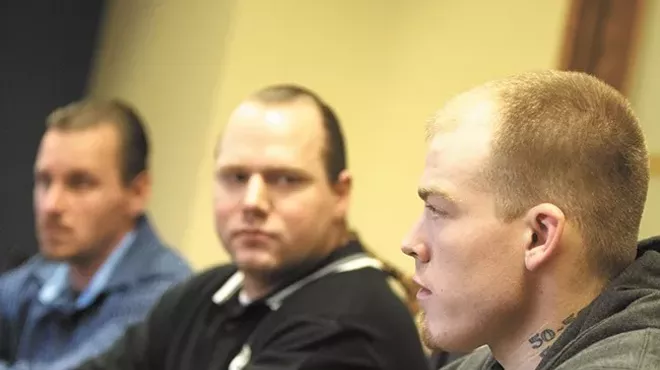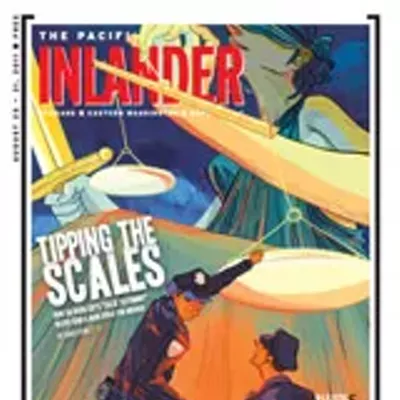“I think it’s all worthy of re-examination, especially when you talk about the potential for locking somebody up for a considerable amount of time,” Spokane County Commissioner Todd Mielke said Monday, responding to last week’s cover story, “Reasonable Doubt,” which raised questions about the conviction of three Spokane men. (You can read the full story here.)
“I would hope the court system would review the circumstances and facts in the case,” Mielke says, “and if there’s new evidence that would affect the outcome, I would hope the legal system would find a way to consider it.”
Related Stories
Reasonable Doubt
How spotty detective work and careless prosecution may have put the wrong men behind bars
VIDEO
Go behind bars with Gassman and the guy who helped frame him
The case involves three Spokane men — Tyler Gassman, Robert Larson and Paul Statler — who were convicted last February of robbing drug dealers of $4,000. Gassman received 25 years in prison, Larson got 20 and Statler, because of a robbery conviction as a juvenile, was sentenced to 41 years.
The men were found guilty on the word of a jailhouse snitch named Matt Dunham, who changed his story multiple times but still got his sentence trimmed to 18 months for testifying.
After the trio was convicted, one of Dunham’s friends, Anthony Kongchunji, came forward with this admission: He said he and Dunham hatched a plan inside jail to pin their crimes on someone else to protect their friends, who were actually involved.
With Kongchunji’s confession, defense attorneys filed for a new trial based on newly discovered evidence, but it was denied.
Spokane County Sheriff Ozzie Knezovich said during an interview on Monday that he was talking with his detectives to make sure they had handled the case properly. “We will get to the bottom of all your questions — that I owe to the citizens,” he says. “We have an obligation to make sure we’ve done due diligence.”
The next morning, in a follow-up interview, Knezovich and the two main investigators said they were confident the right men were behind bars. Besides the testimony of Dunham, the detectives say they had amassed lots of other evidence against the three, including allegations that one of the men, Paul Statler, may have illegally purchased an assault rifle at a pawnshop.
They also say that Kongchunji had earlier corroborated facts provided by Dunham. They believe Kongchunji is changing his story now to help Gassman, Statler and Larson — and to avoid being labeled a snitch in prison.
Knezovich says his detectives conducted thorough investigations, which revealed that the three men were part of a larger robbery crew that targeted drug dealers. He dismissed the suggestion that Dunham, the snitch, could have concocted the whole story with Kongchunji.
“I have never seen a false story be able to withstand an interrogation,” the sheriff says. “You’d really have to practice and practice and practice.”
Knezovich adds, “I’ve talked to these guys [the detectives] and [looked at] all their notes and everything else, there’s nothing here. … It looks like there was plenty of probable cause to send this to trial and a jury of their peers found them guilty.”
The detectives, Bill Francis and Doug Marske, say the last thing they would ever want to do is to put innocent people behind bars.
For his part, Spokane County Prosecuting Attorney Steve Tucker says he’s not very familiar with the facts in the case, besides what he read in The Inlander. And he’s not compelled to look any deeper, he says.
“I don’t think you realize how many calls I get like this. It’s not practical. The system is taking care of it,” Tucker says. “The further investigation will come from the appellate attorneys. They’ll look at it.”
Asked whether he would consider offering the men a new trial, Tucker laughed. “We start doing that, we’re going to have all kinds of things going on. ... We’d have all kinds of people coming out and wanting a new trial if we started granting that based on something that I don’t know about, because I don’t know the evidence in that case.”
Dave Stevens, a former county deputy prosecutor, would not comment directly on the case because of a pending appeal, but he says he’s reluctant to prosecute cases that rely solely on snitch testimony.
“These guys have a huge incentive to not tell the truth, to twist things, to put things on other people,” he says. Stevens was fired by Tucker last week when he announced his candidacy for Tucker’s job.
If elected, Stevens says he would create a policy manual for all prosecutors and in that manual he’d discourage investigators’ use of “free talks” — where someone like Matt Dunhan agrees to talk to detectives as long as it’s not used against him — except as a last resort.
Stevens says he would also caution against relying on snitch testimony that is not corroborated by any other evidence. A 2004 study by Northwestern University’s Center for Wrongful Convictions shows that snitches are the leading cause of wrongful convictions in capital cases. In fact, because of the unreliability of snitches, a dozen or so states now require their testimony to be corroborated by some other evidence. Washington is not one of those states.
“Snitches are inherently ... ‘dangerous’ is the word that comes to mind,” Steven says.























